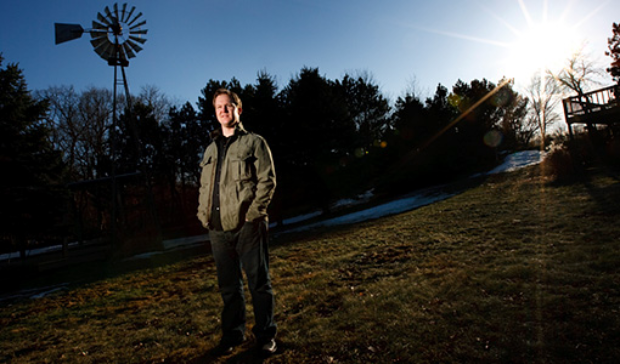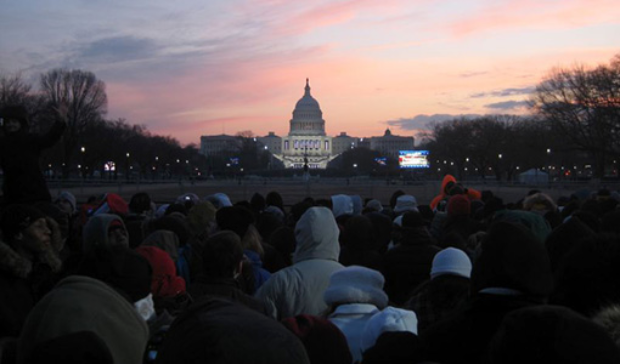Every summer for the last seven years, Paul Creager ’98, has knocked on about 30 of his neighbors’ doors in May Township, just north of Stillwater. Because of noise and crowd concerns, Creager needs their permission to hold his film and music festival, an event that draws a crowd of more than 400 to the area on his parents’ farm.
"Even if they are slightly out of the range of sound, I invite them to send out a positive message and to pre-empt anything that could get in the way of their support," Creager said. “My neighbors are great people. Even if the sound does bother them, they alwaysremind me that it’s only one day a year, and they can handle it.”
With his neighbors’ blessing secured, Creager, along with his fiancée, Angela Knudson,his parents, Warren and Linda, and a host of volunteers have held the Square LakeFilm and Music Festival every August since 2002. The festival is a celebration of the local arts scene and features rotating musical acts and short films outdoors on the Creager property.
The idea first came to Creager when he was in Japan teaching in the Japan Exchangeand Teaching Program. He heard about several small, local film and musical festivals.What he saw impressed him.
“I saw some really amazing performances,” he said. “There was a balance between being quaint and unproduced. I thought to myself, ‘I could do this.’”
His parents were open to the idea from the beginning. His mother comes from a family of musicians and his father from a family of do-it-yourselfers. “I try to make the event something they can interact with. My parents have bought the CDs of several of the bands that have performed,” Creager says with some pride. “And people who come to the festival often thank them for their patience and willingness to host the event.”
Creager’s own music experience led him to believe that his parents’ farm might serve as a perfect venue. He played drums for a couple of bands in high school that had practiced in the barn, and he knew the land could be well suited for a small festival.
“We have a natural amphitheater,” Creager said. “And we can mount our lighting on the windmill. The property is very conducive for an event like this.”
Reflecting on the importance of featuring both music and film, Creager believes thatharnessing a strong interest in the local music scene only will increase the focus for local filmmakers. “We think those two communities can benefit from each other’s growth,” he said.
While there are plenty of opportunities for festivalgoers to experience film and music, the festival also features an event that combines both arts. Every year a local band provides a live score for one of the films.
“The film score is the highlight of it for me, because it’s a commissioned piece,” Creager said. “The crowd is in rapture when watching it. It bonds together the people at the event.”
Since its inception, the festival has grown consistently in size and quality. For the first few years, Creager used his tax rebate to finance the festival and was happy if he made that back. Now, the festival is funded through grants from the Metropolitan Regional Arts Council, the Minnesota State Arts Board and the St. Croix Valley Community Foundation.
“I’m happy to have that support,” Creager said. “It’s obvious that the cities inMinnesota value the arts.”
Additionally, admission to the festival is now capped at 400, and the film and music submissions flow to the Creager house year round.
This year Creager expects to receive 150-200 short films alone. With the help of a jury made of Creagers’ “local heroes,” including Mystery Science Theater 3000 alums Trace Beaulieu and Jeff Stonehouse and screenwriter Shawn Otto, that number will be whittled to 45 films to be screened.
Creager said that receiving the submissions is one of the most rewarding parts ofhosting the festival.
“We’re excited when we work with a musician who is just emerging, or a filmmaker who has made a very fine short film,” he said. “That’s what we want to do – work with people when they’re in that exciting, emerging time in their career.”
Creager’s fledgling movie career recently received a boost when his own film wasaccepted into the 2009 Minneapolis St. Paul International Film Festival (held in April). “Resonance: The Odyssey of the Bells” is his debut documentary film effort, a project he has worked on for more than four years.
Creager and his family increasingly are concerned with the environmental impactof the festival. They now offer discounted admission to attendees who bike to theevent. Last year 120 people (including some performers) rode their bikes from Minneapolis, a 76-mile round trip. They hope that someday every attendee will bike to the festival.
“Cars take up a lot of space,” Creager says. “We don’t want to build the eventaround parking. We’re at a location that is accessible by foot.”
Creager also has found a way to bring the festival to his day job. Along with planning the festival and developing his own film work, Creager teaches at Gordon Parks High School in St. Paul. The school, an alternative learning center that focuses on media art, seems like the perfect fit. He says that the festival has created a network of people with whom he shares his students’ work.
“When a student starts to create a media project, it doesn’t take me too long to figure out who I could contact to take a look at it,” he said. “It’s an added perk for the students to bring that network to the classroom.
“There’s a seamless connection between the festival, my film work and what I do during the day. It’s great.”
This year’s festival will be held Aug. 15. Tickets are $15 and are available via the festival Web site, although Creager gives free admission to volunteers. Attendees are welcome to camp overnight and to bring their own food and beverages.
“There’s a lot of freedom and space for attendees to set up a tent and spread out,” Creager said. He stresses that the event has a small, intimate feel, unlike bigger festivals that “pat you down and force you to buy $4 bottles of water.”
Ultimately, Creager hopes that the festival provides an opportunity for attendees and performers alike to connect with each other and foster additional creativity in their communities.
“Community is really an important thing for me – in the way that you not only live in a place, but you do things to make that place better. I feel wealthy for what that gives back to me. It’s very satisfying to connect to local art."





